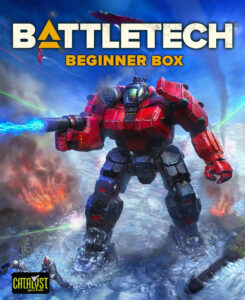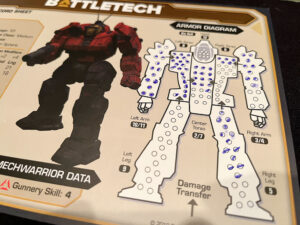 In 1985, a now-defunct publisher created a skirmish game of giant mechs called Battletech: A Game of Armored Combat. I’m guessing at the time, they had no idea it would survive another 35+ years in a variety of different editions. Today, the current publisher of Battletech is Catalyst Games. A few years ago they helped celebrate the anniversary of Battletech with a new slate of releases. The one that intrigued me the most—having never played the game—was the Battletech: Beginner Box. The thought of giant mechs shooting and destroying each other bit by bit definitely piqued my interest, so I picked up a copy of this entry-level game. Does it really deliver on the Battletech experience in a package designed for newbies? Let’s find out!
In 1985, a now-defunct publisher created a skirmish game of giant mechs called Battletech: A Game of Armored Combat. I’m guessing at the time, they had no idea it would survive another 35+ years in a variety of different editions. Today, the current publisher of Battletech is Catalyst Games. A few years ago they helped celebrate the anniversary of Battletech with a new slate of releases. The one that intrigued me the most—having never played the game—was the Battletech: Beginner Box. The thought of giant mechs shooting and destroying each other bit by bit definitely piqued my interest, so I picked up a copy of this entry-level game. Does it really deliver on the Battletech experience in a package designed for newbies? Let’s find out!
Gameplay Overview:
Battletech is a game that has a lot going on, so explaining all the rules here would take forever and a day. While the Beginner Box does streamline a lot of the original game, it’s also not shy with throwing piles of tables at you. But here is the basic structure of the Beginner Box gameplay. If you want the full rundown, you can download a PDF of the rules here.

Each player will field a group, called a lance, of one or more mechs. Usually, a Lance maxes out at 4 mechs. For the first scenario in this box, they recommend a Griffen mech and a Wolverine mech in a 1v1 matchup.
Each round has a structure of:
1. Initiative Phase: roll 2d6 and the player with the higher roll wins initiative.
2. Movement phase: Each player, starting with the loser of initiative, can move their mechs. Mechs move a specific amount of hexes as either a walk, run, or jump.
3. Weapon Attack Phase: Weapon attacks in Battletech center around a target number, and there is a helpful GATOR acronym to help figure out an attack’s target number.
- G: Gunnery Skill – Default is 4
- A: Attacker Movement Value: Your movement mode for the round will determine how much to add to this number
- T: Target Movement Modifier: The farther your target moved in a round, the harder it is to hit.
- O: Other Modifiers: A catchall for misc modifiers. In the Beginner Box, it mostly has to do with cover. If your line of sight passes through some trees, the shot is harder to make.
- R: Range: Mech weapons have a short, medium, and long range. Medium and Long ranges add +2 and +4, respectively, to your roll.
Once you’ve figured out your target number, you roll 2d6. A roll equal to or greater than your target number is a hit.
4. Hit Location and Damage: Once all hits have been determined, you roll 2d6 for each hit to see where it lands on your target. For each hit, you mark off a number of circles on that location equal to the damage of a weapon. Once all the circles in a location are filled, that part of the mech is destroyed. If both legs, the torso, or the head are destroyed, the mech is turned to scrap.

Game Experience:
As I was flipping through the Beginner Box rulebook, I was impressed at how streamlined this game actually was. Coming from a root of a skirmish game from the 80s, I expected lots of granular details and pages of charts to have to read through to play the game. But for this one, they are all about getting you into the actions with the bare minimum of rules. Battletech veterans will notice that things like heat buildup, critical hits, indirect fire, internal structure, melee attacks, and even torso twisting are stripped from the game. What’s left is a very accessible skirmish game that seems to capture the essence of Battletech.
I’m sure at this point you are asking, “Is this some subpar version of Battletech with rules so streamlined that it’s basically a kid’s game?” Definitely not as there is still plenty for players to sink their teeth into. Take missiles for example. If you fire off a cluster of 10 missiles at your opponent, you not only have to roll to see if you hit, but also roll to see how many hit, and also where they hit. I will say that without critical hits and heat to manage, the game does lose a bit of its tactical interest. This box doesn’t really get into things like terrain or elevation either. What that means is that after a few scenarios, you will probably start to get a little bored with what you have here.

But that’s ok. Because there is a place to move right on to when you are ready for more. Battletech: A Game of Armored Combat is the next step in this game. I won’t go into the specifics of that one, as that’s a story for another review, but the Beginner Box’s entire goal is to prepare you for the Game of Armored Combat. This is the appetizer for the main course. And on that front, it succeeds in spades. After just a few games of the Beginner rules, I found myself itching for more. I had a basic understanding of movement and weapons attacks, but now I want to know how things like heat and critical hits affect the game.
Finally, it’s hard to find fault with the components of the Beginner Box, but that’s mostly because of its price point. For a $20 MSRP you get two minis, some standees, dry erase mech sheets, a rulebook, a lore book, and a two-sided map. I will say that the map paper feels super cheap. But all together, this box is a great value for what you are paying. And if you decide to setup up in to other games in the line, you already have some components to use as pretty much everything except the beginner mech sheets should work in the full version of the game.
Final Thoughts:
Catalyst Games put together an impressive little product here considering their goals. If you ever thought about dipping your toes into the armored combat waters, the Battletech Beginner Box is a fantastic entry point. It gives you a streamlined version of the rules, but not so far off from the core game that it doesn’t work as a stepping stone. This product is meant to wet your appetite for Battletech, and it succeeds in spades. However, I will also say that it’s probably one that you won’t stay with for long. Either you’ll love it and dive straight for Battletech: A Game of Armored Combat, or you’ll realize it’s not for you and move on. In either case, it’s worth checking out.
Final Score: 4 Stars – A great entry point into a classic skirmish game.
 Hits:
Hits:
• Excellent value for its price point
• Streamlined rules make it easy to get to the table
• Many of the components can be used in the full game
• Teaches you the basics without overwhelming you.
Misses:
• Doesn’t have a ton of staying power
• Map paper feels pretty cheap
Source: Board Game Quest





